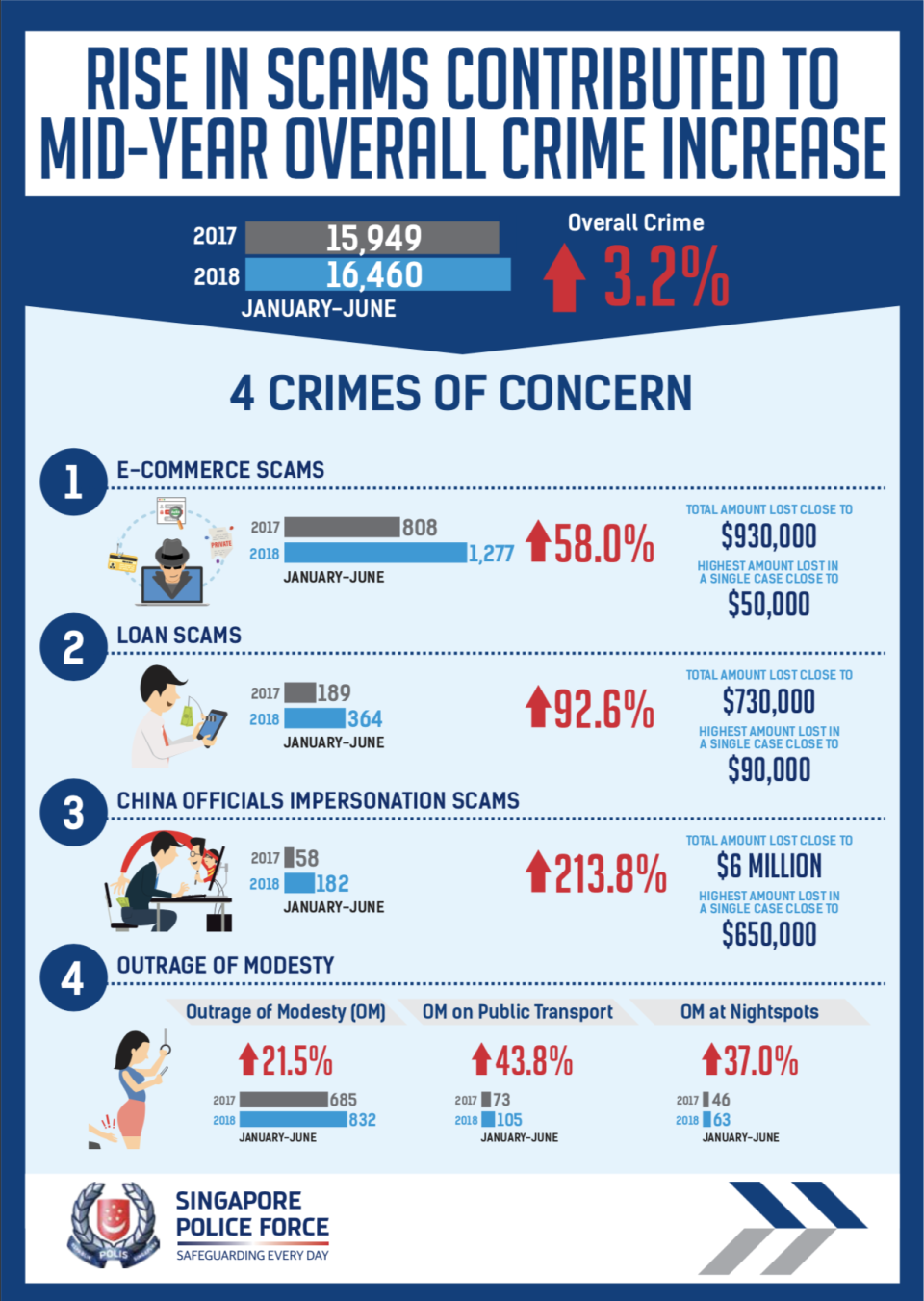Crime cases up 3.2% in first half of 2018 amid sharp spike in scams: police

The number of crime cases here for the first six months of 2018 rose by 3.2 per cent compared with the same period last year, driven largely by a sharp rise in e-commerce, loan and “China officials” impersonation scams.
In the Singapore Police Force’s (SPF) mid-year crime statistics report released on Thursday (23 August), the SPF said that it handled 16,460 cases from January till June 2018, up from 15,949 cases in the same period last year.
The figure includes 1,823 cases of e-commerce, loan and “China officials” scams, a 72 per cent spike from the previous year.
“With pervasive Internet penetration and greater prevalence of smartphones in Singapore, more Singaporeans are going online. This has likely contributed to the increase in online commercial crime cases,” said the SPF report, which added that online crimes are particularly challenging to solve because of the “borderless nature” of the Internet.
Many of these online commercial crimes are committed remotely by foreign syndicates, the police said. The largest amount cheated in a single case in the first half of this year was about $50,000.
Some 80 per cent of the e-commerce scams took place on the Carousell online marketplace, with common transactions involving electronic gadgets and tickets to events and attractions.
Along with electronic items, the scams often involved “discounted” tickets events and public attractions, in particular those for entrance to Universal Studios Singapore.
The largest amount cheated in a single case of a “China officials” impersonation scam was about $650,000, said the SPF. In June this year, police arrested two men for their suspected involvement in a series of these scams and seized cash amounting to about $590,000.
This was the largest amount seized by the CAD in relation to such scams in 2018.
Outrage of modesty remains a key concern

Outrage of modesty (OM) cases increased by more than 21 per cent to 832 cases in the first half of this year, up from 685 cases in the same period last year. Many of these cases took place at public entertainment nightspots and on public transport.
To combat this rise, the police will launch a Smart Clubbing Campaign later this year in partnership with public entertainment outlets in Clarke Quay. The campaign aims to create awareness of crimes commonly committed against patrons at public entertainment outlets, such as OM.
The campaign also seeks to educate members of the public on what to do if they witness or are victims of crimes at such outlets, and will urges them to take personal responsibility by adopting the necessary crime prevention measures.
The entertainment outlets will also adopt measures such as displaying glow-in-the-dark crime advisories, while management and service staff will maintain a continual lookout for patrons who may appear tipsy or drunk.
Decrease in love and credit-for-sex scams
The number of Internet love scams fell for the first time in five years, with the total amount cheated dropping to around $12 million across the first half of this year – down from about $22 million over the same period last year.
Police attributed this improvement to the formation of the Transnational Commercial Crime Task Force (TCTF) under the Commercial Affairs Department (CAD), which investigates all scams that involve foreign crime syndicates.
Since its formation on 1 October last year, the TCTF has seized more than $1.1 million and closed more than 400 bank accounts belonging to money mules who were involved in such scams. This has disrupted the operation of such syndicates.
Police have also been working closely with remittance agencies and banks to train their frontline staff to detect customers who may be scam victims. This has resulted in several successful interventions.
Meanwhile, credit-for-sex scams fell by 18 per cent, thanks to the partnership with convenience stores such as 7-11 and Cheers, which provide training to enable their staff to identify customers who may be victims of such scams.
These staff members look out for potential scam victims and advise them against buying iTunes cards, which is one mode of payment in such credit-for-sex scams. The convenience stores also display scam advisories prominently in the premises to warn customers.
Related stories:
80% of e-commerce scams in first half of 2018 took place on Carousell platform: police
Residents patrol Queenstown MRT station in pilot partnership with police
Woman arrested for JJ Lin concert and NDP ticket scams
55 hauled up by police for scams involving over $1.8M
China officials impersonation scam: Man charged for collecting $74,000 from victims



